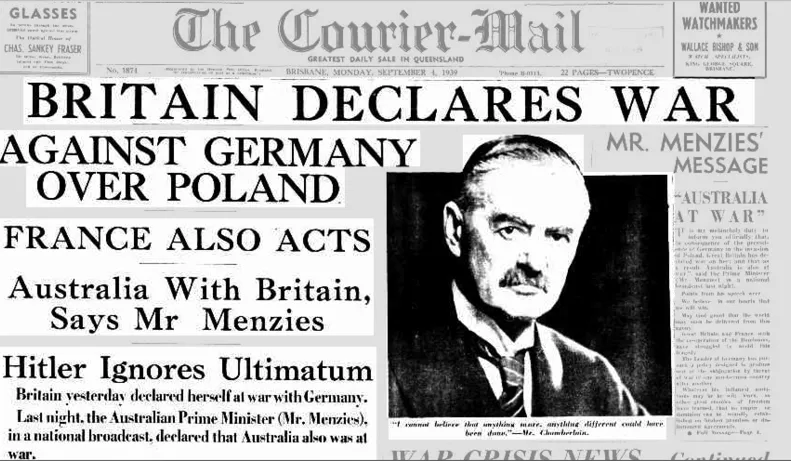![]()
Chapter 1
The Englishman and the ABC Broadcast:
Australia declares war on Germany
The Englishman
My name is Douglas Channell and my story started in England with my birth in 1907. Like most boys from that period I attended school and joined the Territorial Army, achieving the rank of officer before leaving school. In 1921 I was too young to join the regular army, so at the tender age of fourteen I decided to join the merchant navy. I had to lie about my age and told the captain I was fifteen. Being a big lad for my age I could easily pass myself off as older.
I was after adventure and travel and I certainly got it. I experienced quite a few rough trips and the captain was not the best man to work for. After a couple of years the ship arrived in Townsville, Australia. By this stage the crew called a strike and refused to take orders from the rogue of a captain. I was one of the men sacked and left stranded in a country I knew little about, but on the other hand I did like what I saw. At least here, unlike some of the other ports we had docked in, everyone spoke the Queen’s English.
I had to borrow money and some shoes from one of the other seaman and set about looking for some work. In the newspaper there was a job going at the Stewart Creek Prison. The prison was ten miles (approximately 17 kilometres) out of Townsville, in what seemed to a young fellow like myself, the middle of nowhere. There was nothing around the area and nowhere to go. Applicants needed to be 21 years of age, so I had to lie about my age again as I was only 17 at the time. Anyway, I got the job and stayed for three years. There were very few prisoners at any one time and no escapes were attempted during my time there so life was pretty quiet. I did get a bit of a shock when a couple of sailors I had worked with on the boat ended up being incarcerated at the prison. Life here was too tame for me; the same monotonous procedures day in and day out. So while it was a steady job, I decided to move on.
Travelling around Queensland for a few years, I took work as a jackeroo. Can you imagine it, a big strapping Pommie like myself, standing 6 foot 3 inches in my socks riding around on a horse chasing cattle! I sensed the horse enjoyed throwing me to the ground on more occasions than I care to recount before I mastered the art of riding.
I soon got tired of the lonely life with too few people to talk and laugh with so I was off again. Back to Townsville where I secured a job as a salesman selling oil and tyres. Now, this was a little more like it. Different people to see every day and my gift of the gab ensured I made a good living. During this time I met and married but it was not meant to last.
I eventually worked my way down to Newcastle where I started work as an announcer for a commercial ration station.
Working for the ABC
When I originally auditioned for the Australian Broadcasting Commission (ABC), I was told I was ‘too British’. By 1937 I was offered a job as their early morning announcer at station 2FC (ABC). This was more my style and something I was keen to undertake. I was in my element, especially when I convinced my boss to allow me to take the microphone out onto the street and conduct live interviews with the public. “The people will love it, an opportunity to hear themselves on the radio.” We couldn’t go wrong in my opinion and we didn’t. ‘Man in the Street’ broadcasts became hugely successful and were a great addition to the ABC radio program. Because of the success of the show I was asked to also host ‘Sydney Speaks’.
It was often reported that my program could put listeners in a good mood, sending them off to their jobs with a smile on their faces. Every morning people would gravitate to the wireless, keen to hear the morning’s topic. Mothers would quite often get frustrated because they couldn’t get the children to sit down to the breakfast table, and many of the men would be caught spending too much time listening to the program and then have to run off to get to work.
Some of my more irrepressible remarks, which the listeners found so entertaining, were not always enjoyed by my boss. On more than one occasion I was hauled before him and given a dressing down. But as my programs were so popular they continued on in the same vein much to the delight of the listeners. Life couldn’t get any better; I was in my element.
On Saturday 2 September 1939 Sydney-siders were out in force to watch the rugby league premiership final between Balmain and South Sydney. The Sydney Cricket Ground had a staggering crowd of close to 27,000 footy fans all there to back their favourite team. After a second half score blitz Balmain were declared the premiership winners.
Footy was over and everyone was anticipating the warmer weather, relieved at being free of long cold winter days and nights. We all had so much to look forward to with the forthcoming start of the highly anticipated cricket season and tennis parties. A keen sportsman myself these were events I was looking forward to participating in. Life was good in Australia.
It was spring. Trees were coming into leaf, lawns were starting to grow, flowers were popping up in gardens, and the stark landscape of winter was becoming tinged with green. Life would change dramatically the following day!
The broadcast
News from overseas over the last few months did not bode well for Europe. Newspaper headlines reported rumblings from Germany, which had the whole of Europe on edge. What would Hitler and the Third Reich do next? We were soon to discover Hitler’s plan when he attacked Poland and commenced mass bombardments of its cities at the beginning of September.
On Sunday 3 September 1939, my boss announced Prime Minister Gordon Menzies would be making an address to the nation later in the evening. Little did I realise the impact of Britain’s decision to declare war on Germany and how the upcoming speech would change the course of my life for the next six years.
As scheduled, at 9:15 pm, every national and commercial radio station announcer in Australia paused normal transmissions to tune into the Prime Minister’s address to the nation. Those who owned radios had people from all over their neighbourhood visit. Everyone wanted to know what was about to be broadcast.
Prime Minister Menzies started his speech in a very sombre tone:
Fellow Australians, it is my melancholy duty to inform you officially that, in consequence of the persistence of Germany in her invasion of Poland, Great Britain has declared war upon her, and that, as a result, Australia is also at war. No harder task can fall to the lot of a democratic leader than to make such an announcement. Great Britain and France, with the cooperation of the British Dominions, have struggled to avoid this tragedy. They have, as I firmly believe, been patient; they have kept the door of negotiation open; they have given no cause for aggression. But in the result their efforts have failed and we are, therefore, as a great family of nations, involved in a struggle which we must at all costs win, and which we believe in our hearts we will win ...
It is plain - indeed it is brutally plain - that the Hitler ambition has been, not as he once said, to unite the German peoples under one rule, but to bring under that rule as many European countries, even of alien race, as can be subdued by force.
If such a policy were allowed to go unchecked there could be no security in Europe, and there could be no just peace for the world.
A halt has been called. Force has had to be resorted to check the march of force. Honest dealing, the peaceful adjustment of differences, the rights of independent peoples to live their own lives, the honouring of international obligations and promises - all these things are at stake.
There was never any doubt as to where Great Britain stood in relation to them. There can be no doubt that where Great Britain stands there stand the people of the entire British world.
Bitter as we all feel at this wanton crime, this is not a moment for rhetoric; prompt as the action of many thousands must be, it is for the rest a moment for quiet thinking; for that calm fortitude which rests not upon the beating of drums, but upon the unconquerable spirit of man, created by God in His own image. What may be before us we do not know, nor how long the journey. But this we do know, that Truth is our companion on that journey; that Truth is with us in the battle, and that Truth must win.
Before I end, may I say this to you? In the bitter months that are to come, calmness, resoluteness, confidence and hard work will be required as never before. This war will involve not only soldiers and sailors and airmen, but supplies, foodstuffs, money. Our staying power, and particularly the staying power of the mother country, will be best assisted by keeping our production going; by continuing our avocations and our business as fully as we can; by maintaining employment and with it our strength.
I know that, in spite of the emotions we are all feeling, you will show that Australia is ready to see it through. May God in His mercy and compassion grant that the world may soon be delivered from this agony.
Prime Minister Robert G. Menzies: wartime broadcast. Source: AWM
“BRITAIN DECLARES WAR”
The Courier-Mail
Australians couldn’t believe what they were hearing. Here we were again, only 20 years after the end of the Great War, touted as ...

